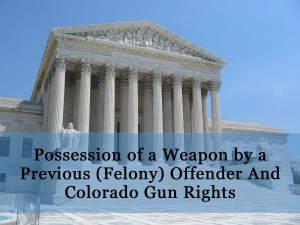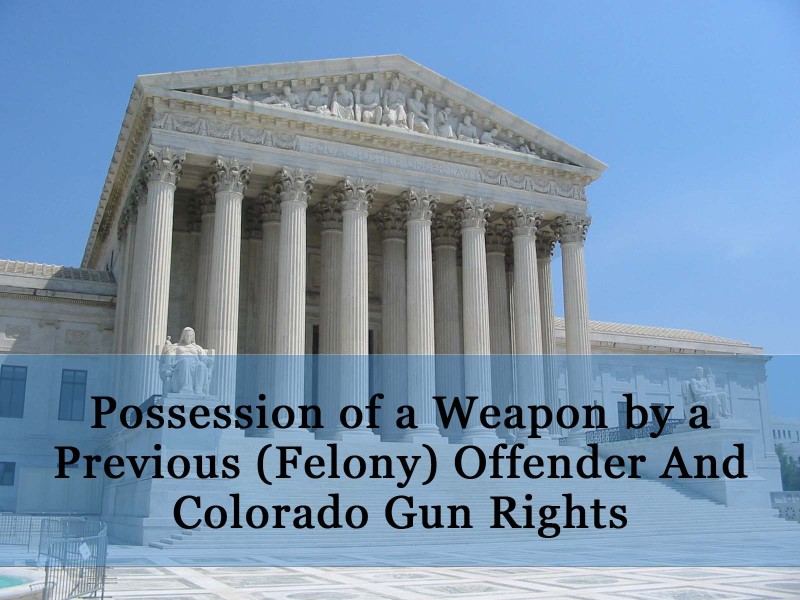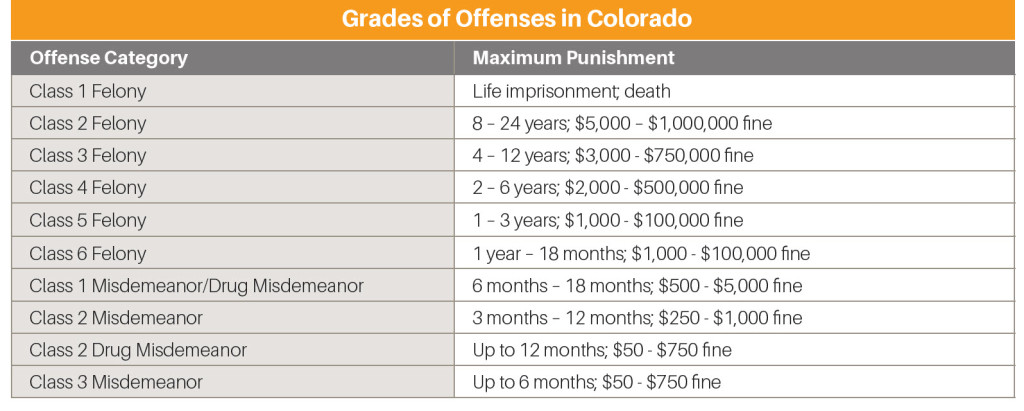






Possession of a Weapon by a Previous (Felony) Offender And Colorado Gun Rights – §18-12-108
 Possession of a Weapon by a Previous (Felony) Offender And Colorado Gun Rights – § 18-12-108. – Colorado has one of the strongest constitutional pro gun rights positions in the country. When the state was formed in 1876 – Colorado’s version of the States’ Bill of Rights – establishing a right to keep and bear arms in defense of one’s home, person, and property – was enacted. The relevant section of the State Constitution is Colo. Const. art. II, § 13.
Possession of a Weapon by a Previous (Felony) Offender And Colorado Gun Rights – § 18-12-108. – Colorado has one of the strongest constitutional pro gun rights positions in the country. When the state was formed in 1876 – Colorado’s version of the States’ Bill of Rights – establishing a right to keep and bear arms in defense of one’s home, person, and property – was enacted. The relevant section of the State Constitution is Colo. Const. art. II, § 13.
That sections reads:
The right of no person to keep and bear arms in defense of his home, person and property, or in aid of the civil power when thereto legally summoned, shall be called into question; but nothing herein contained shall be construed to justify the practice of carrying concealed weapons.
Colo. Const. art. II, § 13
While I have written on this charge before – this article takes a much more comprehensive look at the crime of Possession of Weapon By A Previous Offender.
In 2012, Colorado reaffirmed the strength of the State’s right to bear arms in a well known case – familiarly called Carbajal.
Colorado’s Possession of a Weapon by a Previous Offender § 18-12-108(1), (2)(A), C.R.S..
18-12-108. Possession of Weapons by Previous Offenders
[As to Adults]
(1) A person commits the crime of possession of a weapon by a previous offender if the person knowingly possesses, uses, or carries upon his or her person a firearm as described in section 18-1-901 (3) (h) or any other weapon that is subject to the provisions of this article subsequent to the person’s conviction for a felony, or subsequent to the person’s conviction for attempt or conspiracy to commit a felony, under Colorado or any other state’s law or under federal law.
(2) (a) Except as otherwise provided by paragraphs (b) and (c) of this subsection (2), a person commits a class 6 felony if the person violates subsection (1) of this section.
(b) A person commits a class 5 felony, as provided by section 18-12-102, if the person violates subsection (1) of this section and the weapon is a dangerous weapon, as defined in section 18-12-102 (1).
(c) A person commits a class 5 felony if the person violates subsection (1) of this section and the person’s previous conviction was for burglary, arson, or any felony involving the use of force or the use of a deadly weapon and the violation of subsection (1) of this section occurs as follows:
(I) From the date of conviction to ten years after the date of conviction, if the person was not incarcerated; or
(II) From the date of conviction to ten years after the date of release from confinement, if such person was incarcerated or, if subject to supervision imposed as a result of conviction, ten years after the date of release from supervision.
(d) Any sentence imposed pursuant to this subsection (2) shall run consecutively with any prior sentences being served by the offender.
[As to Juveniles]
(3) A person commits the crime of possession of a weapon by a previous offender if the person knowingly possesses, uses, or carries upon his or her person a firearm as described in section 18-1-901 (3) (h) or any other weapon that is subject to the provisions of this article subsequent to the person’s adjudication for an act which, if committed by an adult, would constitute a felony, or subsequent to the person’s adjudication for attempt or conspiracy to commit a felony, under Colorado or any other state’s law or under federal law.
(4) (a) Except as otherwise provided by paragraphs (b) and (c) of this subsection (4), a person commits a class 6 felony if the person violates subsection (3) of this section.
(b) A person commits a class 5 felony, as provided by section 18-12-102, if the person violates subsection (3) of this section and the weapon is a dangerous weapon, as defined in section 18-12-102 (1).
(c) A person commits a class 5 felony if the person commits the conduct described in subsection (3) of this section and the person’s previous adjudication was based on an act that, if committed by an adult, would constitute burglary, arson, or any felony involving the use of force or the use of a deadly weapon and the violation of subsection (3) of this section occurs as follows:
(I) From the date of adjudication to ten years after the date of adjudication, if the person was not committed to the department of institutions, or on or after July 1, 1994, to the department of human services; or
(II) From the date of adjudication to ten years after the date of release from commitment, if such person was committed to the department of institutions, or on or after July 1, 1994, to the department of human services or, if subject to supervision imposed as a result of an adjudication, ten years after the date of release from supervision.
(d) Any sentence imposed pursuant to this subsection (4) shall run consecutively with any prior sentences being served by the offender.
(5) A second or subsequent offense under paragraphs (b) and (c) of subsection (2) and paragraphs (b) and (c) of subsection (4) of this section is a class 4 felony.
(6) (a) Upon the discharge of any inmate from the custody of the department of corrections, the department shall provide a written advisement to such inmate of the prohibited acts and penalties specified in this section. The written advisement, at a minimum, shall include the written statement specified in paragraph (c) of this subsection (6).
(b) Any written stipulation for deferred judgment and sentence entered into by a defendant pursuant to section 18-1.3-102 shall contain a written advisement of the prohibited acts and penalties specified in this section. The written advisement, at a minimum, shall include the written statement specified in paragraph (c) of this subsection (6).
(c) The written statement shall provide that:
(I) (A) A person commits the crime of possession of a weapon by a previous offender in violation of this section if the person knowingly possesses, uses, or carries upon his or her person a firearm as described in section 18-1-901 (3) (h), or any other weapon that is subject to the provisions of this title subsequent to the person’s conviction for a felony, or subsequent to the person’s conviction for attempt or conspiracy to commit a felony, or subsequent to the person’s conviction for a misdemeanor crime of domestic violence as defined in 18 U.S.C. sec. 921 (a) (33) (A), or subsequent to the person’s conviction for attempt or conspiracy to commit such misdemeanor crime of domestic violence; and
(B) For the purposes of this paragraph (c), “felony” means any felony under Colorado law, federal law, or the laws of any other state; and
(II) A violation of this section may result in a sentence of imprisonment or fine, or both.
(d) The act of providing the written advisement described in this subsection (6) or the failure to provide such advisement may not be used as a defense to any crime charged and may not provide any basis for collateral attack on, or for appellate relief concerning, any conviction.
Other Important Statutory Definitions
Certain important definitions apply to this law – From Section 18-1-901 (3) we take:
(e) “Deadly weapon” means:
(I) A firearm, whether loaded or unloaded; or
(II) A knife, bludgeon, or any other weapon, device, instrument, material, or substance, whether animate or inanimate, that, in the manner it is used or intended to be used, is capable of producing death or serious bodily injury.
(h) “Firearm” means:
any handgun, automatic, revolver, pistol, rifle, shotgun, or other instrument or device capable or intended to be capable of discharging bullets, cartridges, or other explosive charges.
From Section 18-12-102(1) C.R.S.
A “Dangerous Weapon” is:
firearm silencer, a machine gun, a short shotgun (barrel less than 18″ and overall length of less than 26″), a short rifle (barrel less than 16″ and overall length of less than 26″), or a ballistic knife.
The Possible Penalties You Face If You Are Convicted Of The Crime Of Possession Of A Weapon By A Previous Offender
First Offense – Possession Of A Weapon By A Previous Offender – NO Aggravators – (F-6)
12 months to – 18 months in prison and/or a fine of $1,000-$100,000.
First Offense – Possession Of A Weapon By A Previous Offender – Aggravators – (F-5)
If certain additional aggravators (facts or circumstances) are established along with a conviction for this crime – the sentence is increased to a Colorado class 5 felony:
If the weapon in question is a dangerous weapon under 18-12-102(1) C.R.S., OR
If the previous felony conviction occurred within 10 years of the later of the date of conviction (if not incarcerated) or the release date from the court’s supervision and the prior conviction is for burglary, arson, or any felony involving the use of force or the use of a deadly weapon.
12 months to 3 years in prison and/or a fine of between $1,000 and $100,000.
Second And Subsequent Conviction For Possession Of A Weapon By A Previous Offender
A second or subsequent conviction for any act that would be a class 5 felony (see immediately above) the sentence is enhanced to a Colorado class 4 felony.
2-6 years in prison (with 3 years mandatory parole), and/or a fine of $2,000-$500,000.
Felony SENTENCING CHART
The Elements Of The Crime That Must Be Proven Before Analyzing The Defense
To defend any criminal charge – a lawyer begins with the constituent elements of that charge – and then attacks them. The best source of those elements is the Colorado jury instruction which breaks out those elements for the jury in trial.
Here is the relevant jury instruction:
Possession of a Weapon by a Previous Offender
The elements of the crime of possession of a weapon by a previous offender are:
1. That the Defendant,
2. in the State of Colorado, at or about the date and place charged,
[3. subsequent to being convicted of [insert the name(s) of the qualifying felony offense(s)],]
[3. subsequent to being convicted of attempt or conspiracy to commit [insert the name(s) of the qualifying felony offense(s)],]
[3. subsequent to being adjudicated for [insert the name(s) of the qualifying act(s)],]
[3. subsequent to being adjudicated for attempt or conspiracy to commit [insert the name(s) of the qualifying felony offense(s)],]
4. knowingly,
5. possessed, used, or carried upon his [her] person a [firearm] [insert name(s) of “any other weapon that is subject to the provisions of this article”].
[6. and that the defendant’s conduct was not legally authorized by the affirmative defense[s] in Instruction[s] ___.]
Defenses To The Charge Of Possession of a Weapon by a Previous Offender
The Mental State Defense – Was The Crime Committed “Knowingly”
If a Defendant does not have the correct mental state during the commission of a crime – in this case acting “knowingly” with respect to his conduct or to a circumstance described by a statute defining an offense – he cannot be guilty of that crime.
Knowingly means you aware that your conduct is of such nature or that such circumstance exists. You act “knowingly” with respect to a result of your conduct, when you are aware that your conduct is practically certain to cause the result.
If you do not “knowingly” have possession of a weapon, even if you are a previous offender, (Possession of a Weapon by a Previous Offender ) there is no crime committed. Mere possession of the weapon alone is not enough, you have to KNOW you have the weapon.
Another variance of this defense is an awareness that you have something – but you had no idea it was a firearm or deadly – dangerous weapon.
The Actual Possession Defense – Did You Actually Possess The Weapon?
The “possession element” of this crime requires “actual” (direct physical control) or “constructive” control over the weapon. Constructive control means that one does not have to be the ONLY possessor of a weapon – one can share that possession with another and still commit this crime. While you may not have actual physical custody of the weapon – if you have the power to exercise control over it – you are in – under the law – in “possession” of it.
The defenses here follow a familiar pattern. The weapon is not YOUR weapon. Since it was not your gun – you have no rights to it and no physical control over it.
The Deadly Weapon/Firearm Defense – Is The Weapon Actually A “Deadly” or “Dangerous” Weapon Or A Firearm Under Colorado Law?
The easy case to prove a violation of Possession of a Weapon by a Previous Offenders is the firearm element. Even a non-functioning weapon meets the broad definition of a “firearm.”
The harder case is for the DA to prove Colorado’s Possession of a Weapon by a Previous Offender Law when that weapon is a knife used for many other purposes.. or deadly weapons which are multi-functional.
The Choice Of Evils “Affirmative” Defenses To Possession of a Weapon by a Previous Offender
Because of Colorado’s strong gun rights position as reflected in the Colorado constitution – Colorado law allows a Defendant to raise an affirmative defense to the charge of LINK Possession of a Weapon by a Previous Offender by permitting the Defendant to present competent evidence that his or her purpose in possessing weapons was defense of home, person, and property.
A Defendant charged with Possession of a Weapon By A Previous Offender may raise this defense on very little evidence. As long as a Defendant presents “some credible evidence” even if it is just a “scintilla” of evidence, in support of the affirmative defense, the Trial Judge must let the jury decide whether the Defendant possessed a weapon for a “constitutionally protected purpose.”
After the evidence is raised, the State then has the burden of disproving the affirmative defense beyond a reasonable doubt.
While the affirmative defense is soundly based on Colorado’s right ti bear arms amendment – the most recent version of the defense adds a requirement to the affirmative defense that the Defendant’s purpose in possessing the weapons arise from a reasonable belief in a threat of imminent harm…
While there is a minority position reflected in a recent (2013) Colorado case which position objects to “imposing an ‘imminent harm’ requirement – (based on the argument that nullifies article II, section 13’s guarantee of the right to keep arms in defense of home, person and property),” the affirmative defense presently includes this problematic language.
The present wording of the affirmative defense appears immediately below.
Known as the Choice of Evils instruction – the Complete Colorado Jury Instruction reads as follows:
Possession of a Weapon by a Previous Offender – Choice of Evils Issue
The evidence presented in this case has raised the affirmative defense of “choice of evils,” as a defense to possession of a weapon by a previous offender.
The defendant’s conduct was legally authorized if:
He [she] possessed the weapon for the purpose of defending his [her] home, person or property from what he [she] reasonably believed to be a threat of imminent harm which was about to occur because of a situation occasioned or developed through no conduct of the defendant.
The prosecution has the burden to prove, beyond a reasonable doubt, that the defendant’s conduct was not legally authorized by this defense. In order to meet this burden of proof, the prosecution must disprove, beyond a reasonable doubt, the above numbered condition.
Some Credible Evidence
A Defendant charged with Possession of a Weapon By A Previous Offender MUST raise some credible evidence of a constitutionally protected purpose for weapon possession. In one case the Colorado Court of Appeals found that a Defendant was not entitled to the choice of evils affirmative defense instruction where he presented no evidence that public possession of weapon in a bar was based on any threat to his person, home, or property.
Colorado’s Supreme Court explains the choice of evils defense as follows:
The choice of evils defense thus does not arise from a “choice” of several courses of action, but rather is based on a real emergency involving specific and imminent grave injury that presents the defendant with no alternatives other than the one taken.
To succeed in asserting choice of evils, a defendant must assert (among other facts) that there was literally no other protective course of action he could have taken other than breaking the law.
The newly reworded defense which requires “imminence” means that logically – there will almost never be enough time to legally acquire a firearm once its use became justified making it virtually impossible for a person with a felony (or who is subject to any future firearm restriction) to legally use a firearm in self-defense.
Put differently, to assert the constitutional defense of choice of evils in this context the posession of the weapon does not technically become “legal” until the injury is “about to occur.”
As one Colorado legal writer put it:
Short of hiring a bodyguard to be on standby with a gun, no defendant will be able to successfully assert the constitutional defense without also confessing to having illegally possessed the weapon one minute prior to the threat.
Possession of a Weapon by a Previous (Felony) Offender And Colorado Gun Rights – §18-12-108.
If you found any of the information I have provided on this web page article helpful please click my Plus+1 or the Share buttons for Twitter and Facebook below so that others may also find it.
The reader is admonished that Colorado criminal law, like criminal law in every state and at the Federal level, changes constantly. The article appearing above was accurate at the time it was drafted but it cannot account for changes occurring after it was uploaded.
If, after reading this article, you have questions about your case and would like to consider retaining our law firm, we invite you to contact us at the Steinberg Colorado Criminal Defense Law Firm – 303-627-7777.
Never stop fighting – never stop believing in yourself and your right to due process of law. You will not be alone in court, H. Michael at your side every step of the way – advocating for justice and the best possible result in your case.
 ABOUT THE AUTHOR: H. Michael Steinberg – Email The Author at [email protected] – A Denver Colorado Criminal Defense Lawyer – or call his office at 303-627-7777 during business hours – or call his cell if you cannot wait and need his immediate assistance – 720-220-2277. Attorney H. Michael Steinberg is passionate about criminal defense. His extensive knowledge and experience of Colorado Criminal Law gives him the edge you need to properly handle your case.
ABOUT THE AUTHOR: H. Michael Steinberg – Email The Author at [email protected] – A Denver Colorado Criminal Defense Lawyer – or call his office at 303-627-7777 during business hours – or call his cell if you cannot wait and need his immediate assistance – 720-220-2277. Attorney H. Michael Steinberg is passionate about criminal defense. His extensive knowledge and experience of Colorado Criminal Law gives him the edge you need to properly handle your case.
“A good criminal defense lawyer is someone who devotes themselves to their client’s case from beginning to end, always realizing that this case is the most important thing in that client’s life.”
You should be careful to make a responsible choice in selecting a Colorado Criminal Defense Lawyer – and we encourage you to “vet” our firm. Over the last 40 plus years – by focusing ONLY on Colorado criminal law – H. Michael has had the necessary time to commit to the task of constantly updating himself on nearly every area of criminal law, to include Colorado criminal law and procedure and trial and courtroom practice. H. Michael works hard to get his clients the best possible results in and out of the courtroom. He has written, and continues to write, extensively on Colorado criminal law and he hopes this article helps you in some small way – Possession of a Weapon by a Previous (Felony) Offender And Colorado Gun Rights – §18-12-108.

Other Articles of Interest:
- Colorado Criminal Law – The Second Amendment – Right To Bear Arms and The Dangerous Weapon
- Colorado State Drug Crimes
- Possession of contraband in the second degree 18-8-204.2 (2)
- Colorado State Felony – Menacing (18-3-206)
- Criminal Possession of a Financial Transaction Device 18-5-903 (2) (a)























